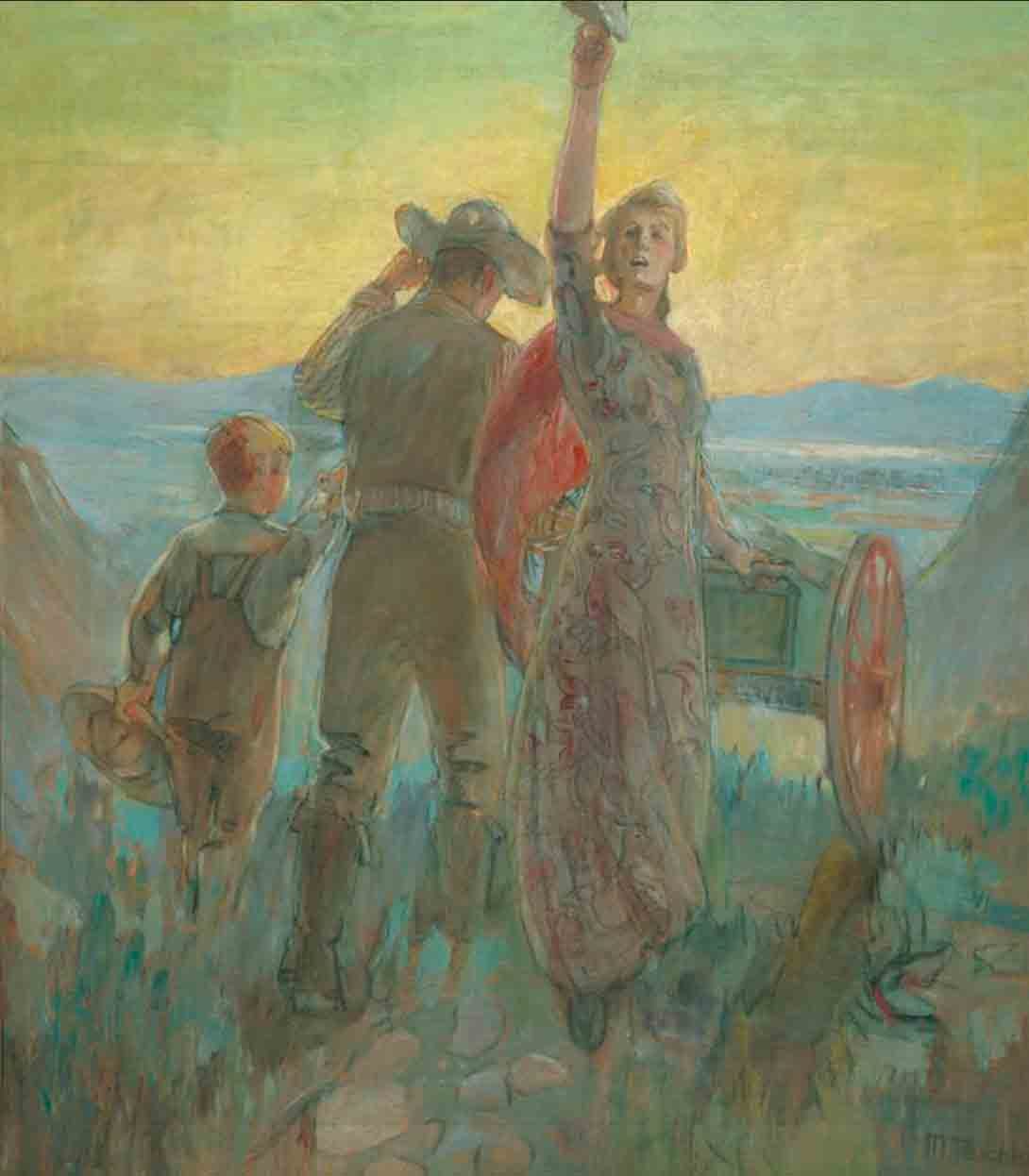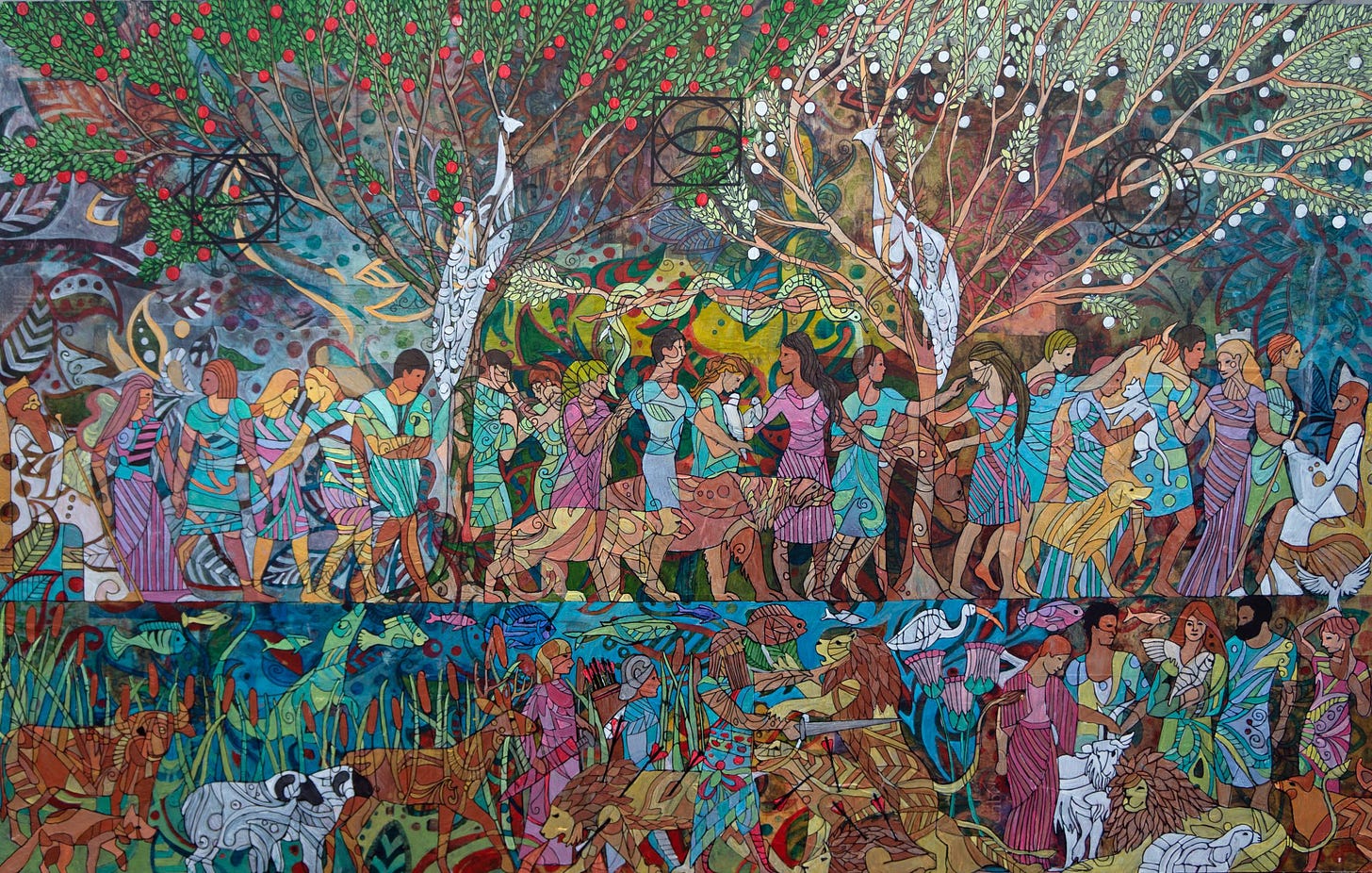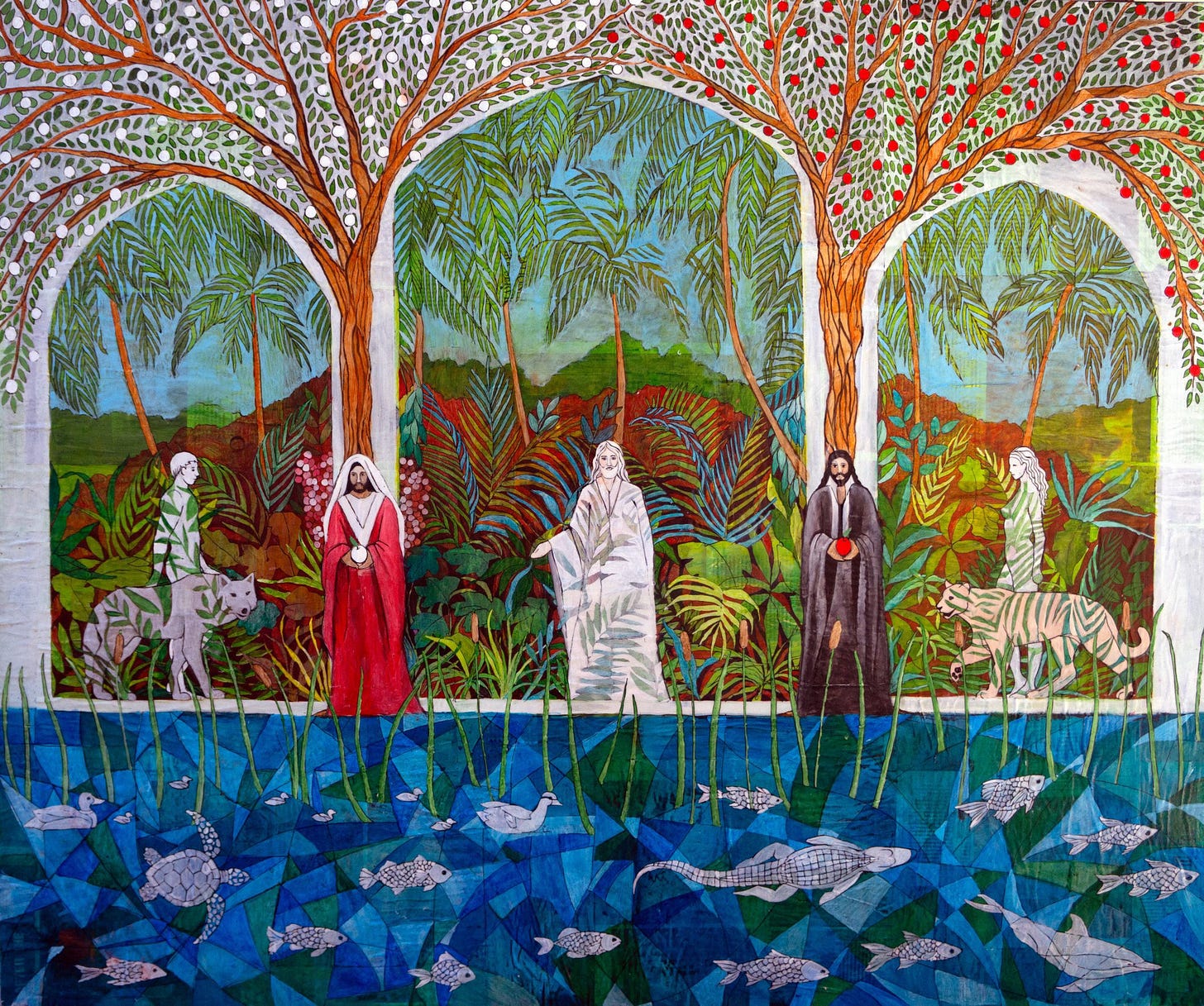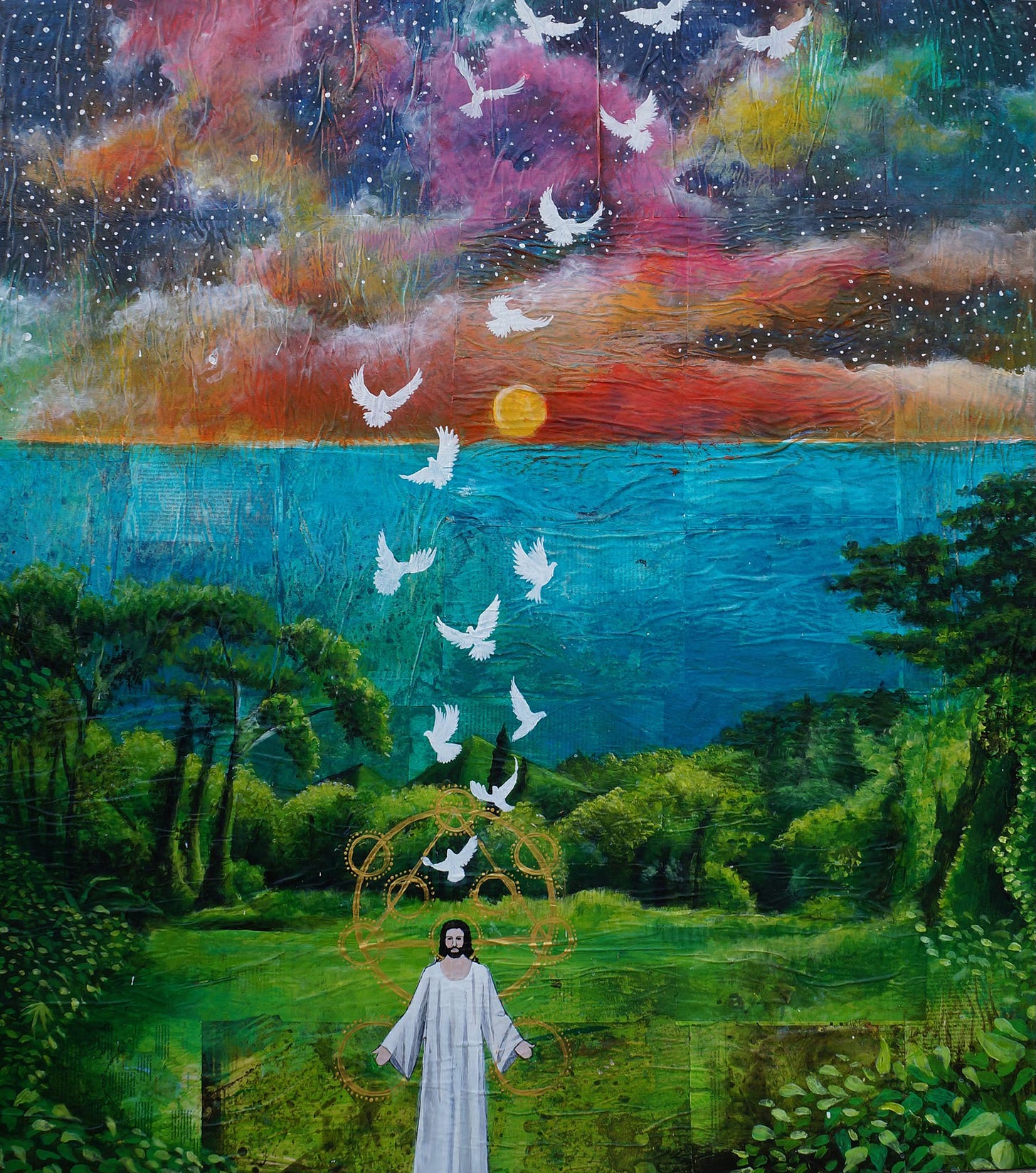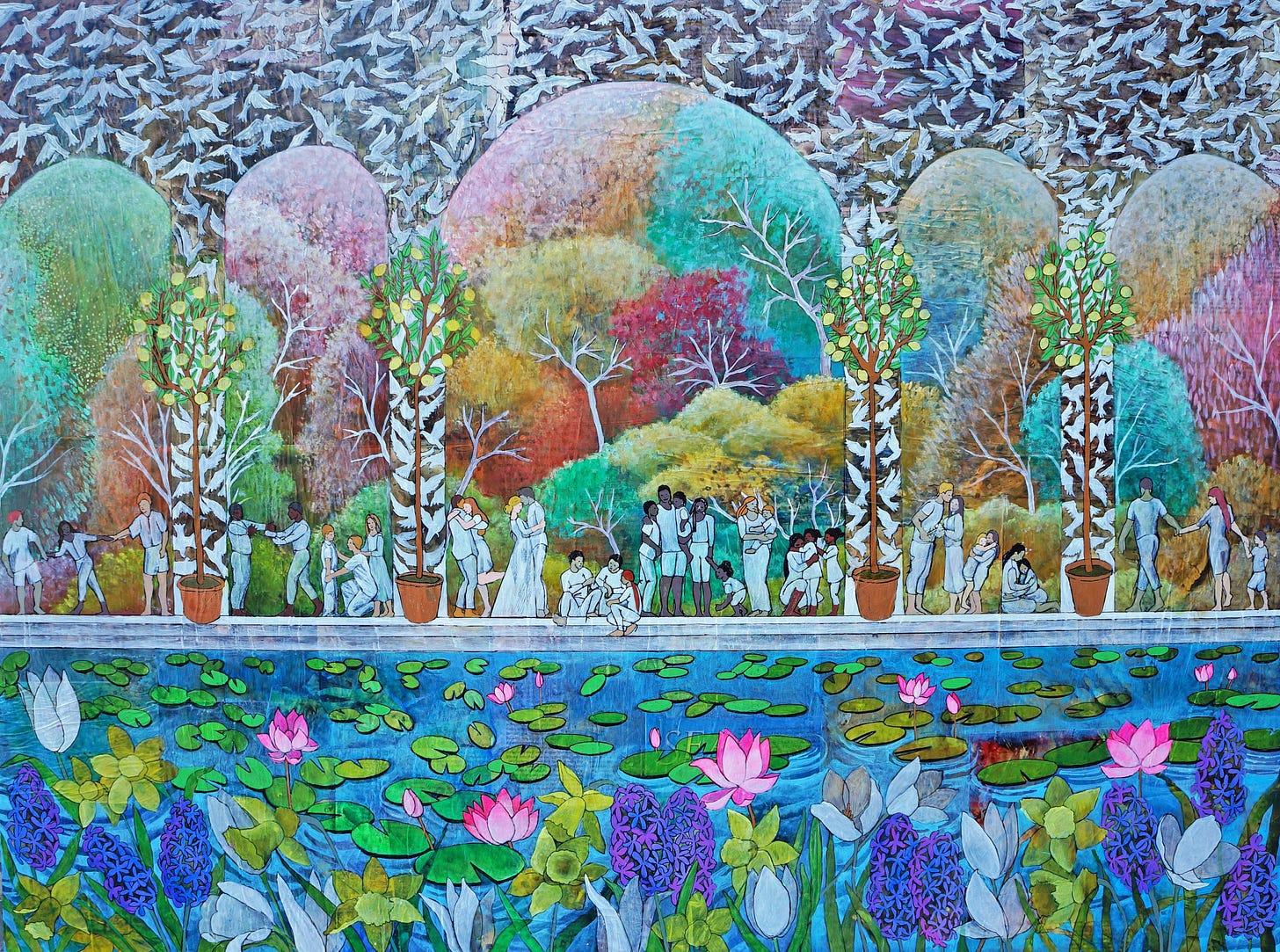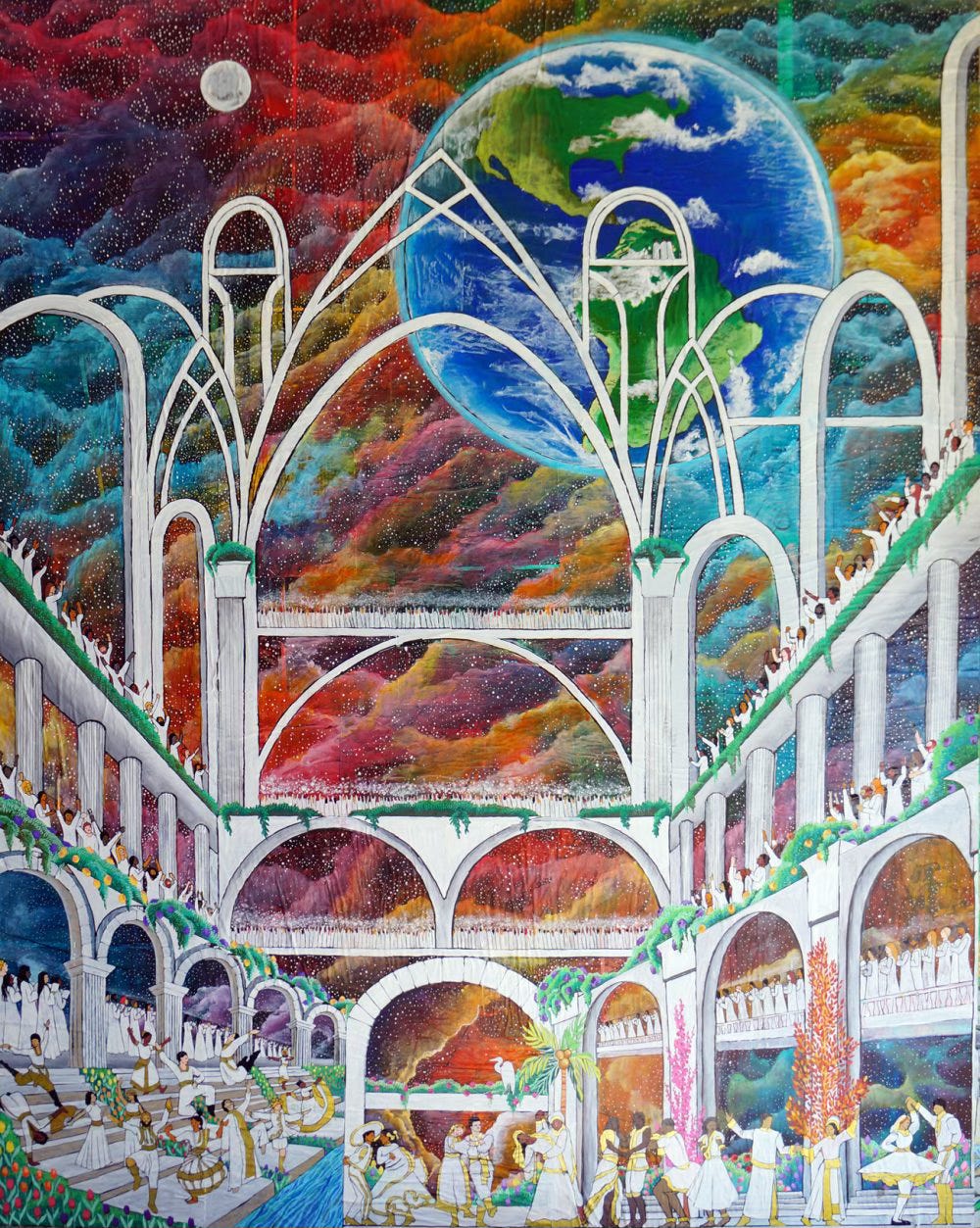Project Zion
The Grand Vision of Evelyn Adams
I met Evelyn Adams in the summer of 2023 while browsing through an exhibition of Minerva Teichert’s artwork. Her exhilarating pose startled me from across the room, and as I approached, her gaze shifted to meet my eyes. Although a painting, she came to life, told me her name, and in an instant absorbed me into her heart and mind so I could hear her account of the vision she had experienced 170 years earlier. Why she chose me after so long to witness what I am about to share, I know not; but she must have sensed how deeply I desired to see what she had seen. So as I took my leave, she winked and whispered, “Ripeness is all—it’s time, it’s you. Do your best.”
This is what Evelyn Adams imparted: Flushed with anticipation after years of longing and weeks of trudging, she had crested the last rough hill and looked out in utter joy on the open valley where the promised Zion was destined to bloom at last and spread everywhere forever—fulfilling the past and future hopes of all souls that had ventured to Earth.
Then in an unmeasurable instant between deciding whether to pray or to shout, her spirit was transported to a lofty peak that seemed to purchase a view of the whole earth and all its inhabitants—from beginning to end of its history. And then she saw a place before Earth where she had been with all those souls who would come to it. She sensed that Earth was not the only time she along with many billions of fellow intelligences had courageously ventured to experience the unknown over the eons. She groaned at the darkness of their seemingly unbearable suffering, then exulted in the light of their indescribable joy. Somehow, she seemed to care deeply for each as Enoch and other seers had. Then she sensed their yearnings for Zion blending with hers.
She knew at that instant she was experiencing the most delicious desire for the cause of Zion—where creative gods freely try to grow in trust and love for each other—worlds without end. She then grasped why warlike strife over what they should do next in their eternal lives had been so devastating to heavenly hopes; and why—ah, that’s why!—the veiled brief existence on Earth and Spirit World was designed to convert eternal gods to love enough to sustain disagreements without strifeful contention: the condition for dynamic togetherness in Zion. Finally, she met and conversed with her Heavenly Parents. She did not share that exchange except to say almost to herself, “We . . . just don't even imagine what . . . who we really are. The veil . . . it hides us all.”
In no more than a few seconds the great vision closed, and transfigured Evelyn Adams felt again her boots on dirt, her fingers on the handcart, and her torso turning back toward her exhausted company straining up the hill behind . . . and then, as if signaling all pilgrims past and yet to come, ageless Evelyn Adams raised her arm, waved her hat wildly, and shouted across time and space, “I can see the valley! We can make it! Keep coming! Zion Ho!”
Evelyn Adams had not imagined another utopian myth of societal transcendence. She was a veil-breacher—like Mother Eve and Father Adam, Old Enoch, Abraham, Melchizedek, Elijah, Moses, Mary, Jesus, Joseph Smith, and many others. She shared with me an inkling of the grand vision of seers, and I saw for an instant that our everlasting lives are each and all together a memorable series of creative dramas that we gods author and act together with no apparent beginning or end.
Her vision moved me so deeply I didn’t want to budge from the painting. Without exaggeration, I think I have never trusted anyone more than Evelyn Adams. She was my Diotima. She infused me with a profound mixture of peace and enthusiasm for the love that the Holy Spirit distills in me as I write this report. Our hope is not empty hope for the cause of Zion. We will eventually attest that the joy of our love proven in stressful conflict will have been worth the suffering we experienced to prove it.
Gods: Becoming More Together
It is crucial to understanding this report that you imagine the possibility that you have always existed in some tangible form with conscious memory in social groups of unique but similar persons—free agents that know and influence each other. We have always existed, and we have always been changing. Imagine that changes we desire to experience are realized from our capacity to purposefully reorganize our personal, social and environmental forms—including so-called fixed laws of physics, math and morality. As gods, we continually institute laws of order—including our own tangible and social forms—to accomplish new purposes and experiences. “Eternal laws” are the laws or orders Eternal Gods institute from time to time.
This view contrasts sharply with traditional theology’s concept of “forever” as timeless eternity outside space-time. Instead, we speak of beginningless and endless sequential duration—infinite history. Gods exist not in motionless repose beyond all empirical experience, but as dynamic social beings with infinite histories available to purposeful concentration—requiring recalling some and veiling others simultaneously in order to pay attention at all.
Evelyn Adams described interpersonal social organizations as the preferred modes of living among the gods with whom we affiliate as family, friends and citizens. With sociality arises the question of attaining group agreement on joint purposes and methods—fundamentally a political problem that heavenly social groups like mortal ones must face. This involves selecting creative designs of tangible (gravity, bodies) and social (families, councils) forms to accomplish joint purposes. Disagreements over the why and how make worlds-without-end go around.
Thus, the always prior question for gods has been “For what purposes do everlasting divine intelligences desire to continue living together forever—and how do we design and make forms for ourselves to get the jobs done?” These issues are continually interesting in dynamic societies of gods who are ever becoming more. In a very ancient tradition our Heavenly Parents held councils to work out What’s next? What more? What novel purposes are proposed? How might they be achieved?
These questions of purpose and method are always negotiable among diverse gods that respect each other’s desires and perspectives. We take for granted that the great purpose of purposes is divine joyfulness. However, among different divinities “godlike” and “joyful” may well be defined differently by dynamic gods with unique histories and tastes. The loving Gods we Earthlings (actually, veiled Kolobians) emulate seem to have no final, well-defined purpose unless it is to make eternal lives more enjoyable, presumably by growing in capacity and desire to love more—love that is manifest in collaborative creative action. Of course, this raises the question: whose joyful purpose will this family of intelligences agree to pursue, and what method should be employed?
Divine Sociality and War in Heaven
The social aspect of our dynamic eternal existence provides awareness of differences of perspectives including kinds and intensities of desires. We have always been free to associate in relations of more or less mutual persuasive influence with other intelligent desirers. When we love each other, we negotiate where our love takes us next as friends and societies. Social gods exist in continual dynamic mutual persuasion contests over the latest purposes to pursue and best ways to achieve them—together in forms of family and friends.
Let us admit it is one thing to live forever together, and another to really enjoy it. The problem with a social organization—even a divine one—that valorizes interpersonal love is that we love each other for our unique differences. Love that desires and acts for the good of the other is the best currency of heavenly society because it can overcome the envy and resentment latent in not being loved as much as or like other gods, or in losing divine contests over whose purpose is most inspiring, or way is best, or design is most beautiful.
Here’s the rub: Divine social life includes oppositional trade-offs that yield “interesting” problems and—often enough—painful suffering. Gods who desire more love also desire more experience, and that desire generates the societal problem of planning what’s next and with whom. Even in heavenly societies where immortals have lots of time, timely decisions for change still seem to matter. The question arises: how long should a dynamic divine society delay before moving on in a way that forces an in-or-out decision for citizens that presumably desire to remain together but cannot agree on just why and how to do so?
Even patient, loving persuasion has its limits among eternally free beings. This raises a profound political question of decision-making among hierarchies of “greater and lesser” intelligences in heavenly society. At what point does loving persuasion morph into unloving coercive threat? There are obvious ways to lovingly include and engage in persuasion contestation over rival plans both in heaven and on earth before tempting war to try (ineffectively) to resolve things once and for all.
Evelyn Adams told me that in her vision she felt the motive force of divine love inflame her soul with desire to intertwine herself completely with her fellow perpetual pioneers, but she also painfully remembered how passionately some premortal companions had recoiled from feeling that divine love could utterly absorb them further into the collective family form that would seriously limit their future forever. They had come to resent being children to parents, a permanent blending into new souls—exciting at first, but never feeling quite themselves. So they had bolted from supporting a new plan to further embody themselves in the family of Heavenly Parents—thinking they could at least exert their radical freedom to resist being inserted again into more limiting bodies not of their own design. Glory—the sincere admiration of fellow gods—was valued highly by all social beings; but in the hierarchical family system they had joined, it could never be theirs really. It would always be reflection or injection of another god’s soul in theirs—never their own.
One of these freedom fighters who knew Evelyn Adams well said to her: “Why continue to exist at all if the goal is dissolving yourself into the will and person of the Highest God? When we agreed to join the family, we all fell into the tempting vortex of loving assimilation—becoming ‘children’ of so-called Heavenly Parents—our existential peers. Now, since we stood up to them in the council, they claim we don’t know what love is—and need to bond ourselves more deeply as family through another birth experience on Earth. What they call ‘loving family’ is a cover for relinquishing our agency to them. And they want to double down in a new world by blending all of us further into each other as families—diluting who we really are.”
Hearing this, for an instant Evelyn Adams felt the suffocating collective weight of everlasting conformity—enforced by continual social pressure to align with desires of parents, Heavenly or otherwise. But she then recalled her own momentous decision to trust testimonies of those gods who, having made different prior decisions than she, had learned from experience in other worlds that family bonds welded in mutual sacrificial love brought much greater joy than mere freedom from submission to pre-programmed family forms or bothersome eternal loyalty oaths.
She applauded the majority’s approval of the heavenly social plan to continue growing together as a big family, but the freedom party strenuously disagreed with any furthering of family influences. Then it happened: the council collapsed in angry resentment—both sides describing each other as betrayers of loving loyalty. A vicious war of wills followed, ripping the hearts of everyone in heaven. The freedom fighters were so shunned by the majority that they left heaven with vows of vengeance and sabotage against the tyrannical Supreme Leaders and the hoodwinked lemmings that followed them. Heaven’s peaceful order was ruined—and something had to be done to repair it.
Envy: Love’s Problem
In the premortal drama, the gods observed all the love lavished on our Heavenly Parents and how much they enjoyed it. Desiring the greater joy of their most admired superiors, many gods despaired of ever achieving the ever-expanding star power of Ahman and Ahmanette. They found themselves plagued with hidden envy instead of love for their superior mentor/parents.
Evelyn sensed that I still could not grasp how, in heaven’s name, war could break out there. She asked me rhetorically, “What do Gods—that seem to have everything—yet desire most?” Answering herself, she said “That which is beyond their capacity to purchase, cause, create or destroy—namely, the invaluable gift of love from another God.” She explained that when some receive that gift and others do not, the temptation to envy appears as the shadow love itself casts.
She then recounted the deeper story of how Lucifer resented the Heavenly Father’s disingenuous promise to his children to bequeath them an inheritance of “all that their father has.” Perhaps downloading all the Father’s divine mind and capacious power could be accomplished, but this would not be the most valuable portion of the divine inheritance. God’s true wealth—the free and continual gift of love from other trustworthy gods—could never be inheritable or transferable! There is nothing you can do or become that will surely cause another to freely love you.
So it came to pass that gods respond in heart and mind differently when some are freely given more love than others. Some are happy for their more “gifted” loved ones, while others are envious of their rivals. Lucifer—as impressive as he was after eons of sociality—was apparently not loved by others as much as Ahman or the Son of Ahman (Jesus). This tested his own love for others to the limit. His choice to envy replaced his choice to love. Envy became his prime emotion, and under cover of self-confident pride, it festered as self-loathing.
So covertly, miserable Lucifer sought to pass it on—inspiring more envy in others. Ever the clever psychologist, he proposed a way to provide hope to billions of divine family members that desired to be loved as much or more than their Heavenly Parents. In his despair of ever reducing his miserable envy, in a vicious perversion of influential love, he told himself that Ahman actually loved so much in order to induce miserable envy in others. Ahman’s love really aimed for self-aggrandizement at the cost of others’ suffering.
Feeling so far behind in the score in the game of love, Lucifer bet that others were suffering as much hidden envy as he was. They would agree that fairness—the basis for true love—would have called an end to the first round of subjugation to superiors. With so many ageless souls “in the hole,” it was fair to start the everlasting game again with everyone even all around. His rallying cry was “Term Limits for Supremacy” and “Give All a New Start.”
However, underneath the Luciferian appeal for newness and equality was hidden his desire to surpass all in the game of love by being adored without doing the sacrificial work to build trust and reciprocal desire to love. His “Godlike” solution was to be the most envied—which required many miserable enviers to whom he owed nothing.
The Revised Plan of Happiness
Evelyn Adams then told me that war in heaven was embarrassing to Heavenly Parents whose love was known for its patience. What could have been a good-faith persuasion contest over what’s best to do became a bad-faith coercive contention over suspicious motives and lying. Civil war between impatient friends and family resulted. It was an epic event that traumatized the Kolobian order. The war provided ample evidence to doubt the Gods’ capacity to love their adversaries powerfully enough to influence Lucifer to convert his envy and desire for soul-torturing vengeance to loving persuasive resistance.
Shaken by their own desire to coercively silence their opponents, most of heavenly family humbly agreed they needed to do something to bolster their resolve and grow their capacity to engage their adversaries with loving persuasion. The earlier plan employed likely on many other worlds needed to be revised to develop sterner trust and love that could influence opponents to enjoy the contest of differences without distrust and anger. This was the design criteria for Earth and Spirit World—to develop and prove out the gods’ desire and capacity for such strong mutual love.
The divine family in council again all chose to leave heaven and build reliable love muscles as a remedy to heal the divine family feud that our Heavenly Parents could not repair themselves. The Latter-day Saints can imagine all eternal gods as artists trying to outdo each other in a continual contest for the most beautiful or love-expanding design of the next stage of their everlasting lives. When their design loses a contest among heavenly critics, they can either employ the Buddhist virtue of mudita—taking joy in another’s success—or succumb to envy and the desire to diminish or extinguish both winner and loser.
Since heaven as everlasting duration is dynamic, there will always be another opportunity, another contest. No winner or loser is final. And, contra Lucifer’s mistake, no one is permanently ahead or behind in sempiternal life.
Evelyn Adams was very wise. She said that none of the best things—love, goodness, truth or beauty—are content to just exist by themselves. They are each social experiences that beg for evaluative comparison to stand out among rivals as the supreme—the most, the best of all. There must be opposition for existence to be intelligible. But for existence to be interesting there must be the eros of supremacy—coupled with the eros of creativity.
The eternal Gods continually desired to design “originals” that rivaled each other for supremacy in all realms of their experience. The eros of supremacy makes heavenly life both interesting and enjoyable when friendly rivals love it when their friends win contests over the most and best. However, each time each loser says out loud: “Next time I may yet persuade you to try my design.” And the winner says sincerely, “I will be happy to be surpassed and ever it shall be—as long as I have another chance at the game.”
But what about Jesus? Ahh, Evelyn Adams ended her erotic lesson with this truth: In resistance to their continual comparative drive for creativity and supremacy, the Gods we worship had developed a desire to enjoy each other as unique Gods that were always mysterious in primal purpose and recent motive—thus existentially incomparable with each other. They experienced a driving mixed desire for exciting, delightful, unconstrained mutual affection and loyal, trustworthy, everlasting mutual friendship. They called this the eros of everlasting friendship, and this drive they trusted would sustain healthy creativity and supremacy and resist the temptation to envy.
Joshua ben Ahman (Jesus), the master of everlasting friendship, stood tall in the revised plan of happiness. Knowing the gods had betrayed their friendship to go to war, he showed a way to tame unique self-existing individuals into truly loyal, trustworthy friends: He would join the veiled gods in the mortal realm where they experience the novel terror of death, and with that, the impressive gift of self-sacrifice of one’s life. Impossible for immortal gods to grasp, the plan of happiness provided a mortal experience of the ultimate act of loyal friendship: to die that another might live.
So Jesus aimed to nail our hearts to his cross and inspire us to do the same for others in the crucible of bewildering mortality. This ultimate sacrifice would move our hearts to desire lasting friendship in eternity so much that gods would seal their trust and love with an oath: In the face of severe disagreements and even future rejection and betrayal, they would digest their suffering, remembering how they lovingly suffered mortal sacrifices, and offer forgiveness to open the chance for “new life” together.
Project Zion: Loving Politics
Zion is a dynamic political project that organizes diverse gods to work together toward mutually agreeable purposes by mutually agreeable means—all subject to change as gods decide in their eternity of infinite possibilities. Evelyn Adams told me she heard Joseph Smith say that Ahman, our Heavenly Father, is, among many other things, a very social and glorious man that especially enjoys collaborative, creative conversations with other eternal gods, especially his family and friends.
In her vision, she saw much of the time Ahman works with councils of peers trying to move things forward in a divine political order of common consent. Ahman recognizes all gods are uncreated eternal beings who are self-authorized. However, these individual souls have been social beings as “far back” as they can or choose to recall. They are used to social orders wherein they grant their authority to group agreements and leaders they trust. This makes for a radical democracy of billions of gods with different experiences and perspectives that make consensus difficult to consistently achieve in heavenly councils—and heavenly politics necessary.
Everlasting sociality requires political order. As Evelyn Adams’ vision revealed, heavenly politics had not produced heavenly results. It seemed the problem was not a matter of methodical order, but of attitudes of the gods when they faced political impasses. In short, the cause of Zion was to produce divine societies where loving politics prevailed because gods chose to be loving politicians.
Political gods that love each other as family and friends become trustworthy rivals at times when they disagree about the way forward. Then peaceful tension of respectful co-resistance enters divine hearts. This robust peace thrives most when contrary perspectives collide to manifest a truth or beauty that neither saw before. That is why love of a trustworthy critic or rival—the basis for loving politics—can be such a joyful experience. It is the proof of strong friendship on Earth and in heaven.
On Earth and Spirit World, humans live as veiled gods, each one an agent unto themselves that has chosen—for the joy anticipated—to follow the ancient way of their fellow gods by self-limiting, by submitting themselves to familial (genetic) and political (elective) hierarchical orders. So the cause of Zion aims to engender loving political friendship among sovereign souls—in a democracy of royals who each become rival influencers.
Loving politics among gods therefore can only thrive when rivals face hierarchical differences in influence with good will and eager excitement as gods exert their unique creative freedom to resist as well as collaborate in the dynamic drama of eternal lives. Evelyn observed that loving politics is a permanent way of divine life with no finality in sight. The erotic explosion of desires for supremacy, creativity, and friendship produce ongoing contests between loving, divine rivals who take joy in being surpassed as much as surpassing—well, almost!
As her vision ended, Evelyn Adams realized her trek to the promised land was an everlasting one. Her thrilling joy at arriving was enhanced by knowing in time she would choose more adventures with her beloved and trusted friends and family. Then she turned and looked me straight in the eyes. “Like me, you are a Latter-day Saint pioneer. I saw you consecrate your life to the cause of Zion. You have been dallying too long. You aren’t young—it’s high time you get on with revolutionizing the world. You will be surprised how many are ready for this.”
She saw my shock, and told me the Latter-day Saints are about to understand that the gathering of Israel is another term for pursuing the cause of Zion. Most of the human family will of course experience their orders of commitment vicariously in the Spirit World. But on Earth with the technology of the last days, millions can join the cause of Zion when the opportunity opens to them.
This simple message is the basis for loving politics, so the Latter-day Saints can rely on it as they make the move to expand the stakes of Zion to include people of good will no matter their religious convictions in loving politics. Evelyn Adams let me know that all the other missions of the Latter-day Saints—from personal righteousness, to eternal family gathering, to conversion efforts, to aiding the needy—would be enhanced by an intense focus on loving politics in the cause of Zion to prepare healthy societies for the Son Ahman’s return to wrap up this great experiment.
As if to give prophetic weight to her thoughts, she then quoted Joseph Smith in the last year of his life regarding his expansive commitment for the cause of Zion: “I intend to lay a foundation of loving friendship to revolutionize and civilize the whole world, and thereby cause wars and contentions to cease.” And to this purpose he added, “If I cannot persuade you my way is right, then I will help you—in your own way—accomplish the good you aim to do.” She paused, looked me in the eye, and asked: “What do you make of these statements?”
I couldn’t help gushing forth: “After about two centuries it is time for Latter-day Saints to explicitly announce a clear fifth mission for the church: fulfilling the cause of Zion. That refers to Joseph Smith’s Christian goal of revolutionizing the whole world with loving friendship that sustains political as well as interpersonal peace that includes respectful seeking and contesting truth together. Loving friendship can develop among different people, organizations and nations only when they mutually trust each other's good will to be strong enough to withstand intractable disagreements over the common good and social value priorities.
The cause of Zion will be fulfilled with loving politicians that sustain dynamic, but peaceful tension of co-resistance as trustworthy rivals and loyal friends. The messianic project from the premortal world to this one—project Zion—has inspired Saints and good-hearted souls from the beginning; but in the fullness of times, it is an important way to prepare the Earth for Jesus to return with prior Zion societies.
The Latter-day Saints and their collaborating partners of good will possess miraculous technical means—like Enoch and Melchizedek in their way—to leverage small numbers to influence millions of people of all convictions to catch the spirit of loving politics required to build Zion societies. The Saints of the last dispensation have been charged by the Elohim with spreading the greatest story ever told: we mortals are here to improve our divine lives together. In these latter days of massive pluralism of beliefs, we can broadly share the news that all good-hearted souls will be welcome to join the contest over the common good as friendly rivals in the cause of Zion.”
Evelyn Adams laughed, saying that was a rather drawn-out answer to her simple question. But she applauded my enthusiasm for the task she saw ahead, and told me not to be timid in getting the word out because so very many lonely and bewildered souls needed encouragement from learning the fuller story of their eternal lives. Then it was over. I wiped my eyes and turned to leave when she whispered her approval of my recounting her vision. As I began walking to the next gallery, I still cannot forget hearing her familiar shout behind me: “It’s so beautiful! It’s better than we hoped! We can all make it! Keep coming! Zion Ho!”
Charles Randall Paul is the founder and president of the Foundation for Religious Diplomacy that aims to build trust and good will between religious critics and rivals.
Art by Sabrina Squires.



